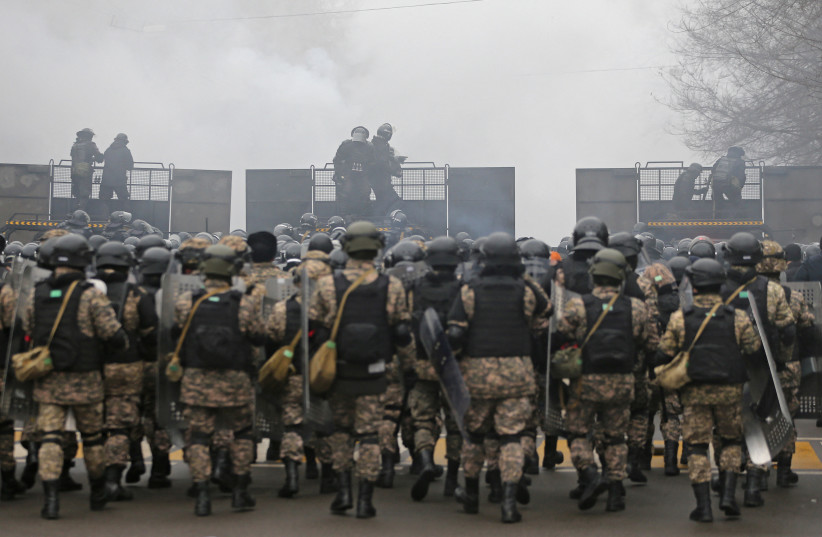Friday, four days after bloody riots unexpectedly broke out in Kazakhstan, the Foreign Ministry issued a statement that at first glance seemed rather hackneyed.
“The Foreign Ministry is closely following the developments in Kazakhstan and hopes for calm and a return to order,” the statement said. “The good and strong relations between Israel and Kazakhstan are based on warm relations between the peoples and flourishing cooperation between governments.”
That was it. There was nothing in the statement, as there was in a tweet by EU foreign policy czar Josep Borrell, about “great concern” regarding the situation on the streets of Kazakhstan and a demand that the “rights and security of civilians must be guaranteed.”
Nor was there a message, like one delivered on Friday by US Secretary of State Antony Blinken, to be wary of Russian intervention. “I think one lesson in recent history is that once Russians are in your house, it’s sometimes very difficult to get them to leave,” Blinken said after Kazakhstan invited the Russian-dominated Collective Security Treaty Organization to help keep the peace.
Dozens of people have reportedly been killed, thousands arrested, several public buildings burned and supermarkets looted in the worst unrest in the country since independence from the Soviet Union 30 years ago. President Kassym-Jomart Tokayev issued shoot-to-kill orders to end the unrest.

Amid all of this, Jerusalem’s message was judgment-free: Israel hopes for a restoration of calm and a continuation of the strong relations between the two states.
Sometimes, however, the banal reflects the truth.
That nondescript statement adequately reflects what Israel hopes to see in Kazakhstan and how it hopes things play out: that stability returns, that the government is not overthrown and that relations between the two countries continue in the positive direction they have been moving since Kazakhstan became independent and established ties with Israel after the collapse of the Soviet Union 30 years ago. For that reason, the apparent return to calm on Sunday in Almaty was welcomed in Jerusalem.
One of the reasons that the Foreign Ministry’s statement was void of any value judgments is because it is not yet clear who was behind the outburst of violence or whose interests it served. One clear thing is that the rise of fuel prices in the oil- and gas-rich state, widely reported as the trigger for the rioting, was the excuse for the violence, not its cause.
At this time the true cause remains the subject of conjecture: perhaps a cadre in Kazakhstan’s elites unhappy with the transfer of power from Nursultan Nazarbayev, the former president who served in that role for three decades, to Tokayev; perhaps Islamists buoyed by recent developments in Afghanistan looking to sow unrest in the secular Muslim country in the heart of Central Asia; perhaps Russia looking to solidify its presence in the mineral-rich strategic country that shares a long border not only with Russia to the west and north but also with China in the east.
In all that, Israel’s interest is that the close relations that it has developed with Kazakhstan continue to flourish.
The Israel-Kazakhstan romance began soon after the fall of the Soviet Union in 1991, when Israel saw an opportunity to make inroads into the emerging states in Central Asia, specifically Kazakhstan and Azerbaijan, which both have secular Muslim majorities.
Israel’s relationship with Kazakhstan was a win-win for both sides. Israel would get oil from Kazakhstan – at one time it provided an estimated one-quarter of Israel’s oil needs – and a relationship with a moderate Muslim state that was interested in promoting dialogue.
When these ties began, it seemed to extend David Ben-Gurion’s famed outer-rim strategy, whereby Jerusalem tries to build ties with countries on its periphery – such as Ethiopia, Iran, and Turkey in the 1950s – to offset the hostility of its immediate neighbors.
Kazakhstan, in turn, saw Israel in the early 1990s as a springboard to the West, particularly to the US, and as a result of then-president Nazarbayev’s ties with Israel, Jewish organizations did open doors for Kazakhstan in Washington and elsewhere in the West.
Kazakhstan also viewed itself as a bridge between East and West, and its cordial relations with Israel helped it to promote this moderate image. In addition, Kazakhstan also got significant investments from Israel and Jewish businessmen as a result of this relationship, as well as significant counterterrorism cooperation and intelligence sharing with Jerusalem.
Thirty years later, the relationship continues to be beneficial for both sides. Israel’s concerns in situations like these are that instability could bring in its wake a new government that does not see Israel in the same light as the previous one did and will radically change the direction of the relationship.
Is this just Israeli paranoia? Hardly. Consider what happened to ties with Iran, which until the fall of the Shah in 1979 was a close friend of Israel, and to relations with Turkey, a strategic ally until Recep Tayyip Erdogan won elections there in 2002 and sent Israel-Turkish relations into a tailspin.
That history helps explain the Israeli hope now for calm and stability in Kazakhstan: so that what has developed with that secular Muslim state over the last three decades continues on the same trajectory into the future.
